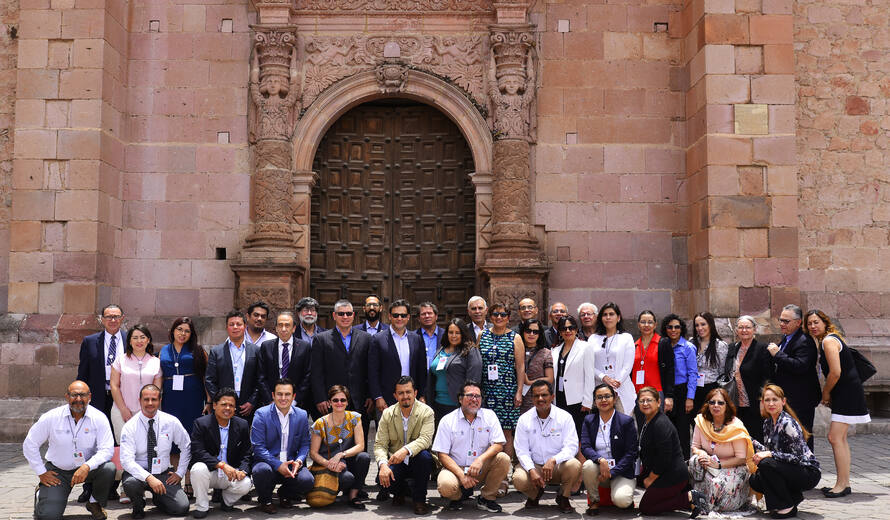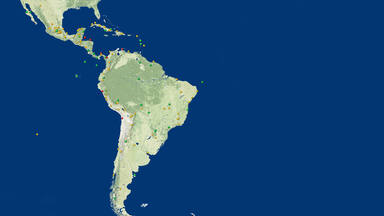Estados Parte de México y América Central adoptan en Zacatecas un “Plan de Acción Patrimonio Mundial” para los próximos 5 años
Siguiendo la estrategia regional aprobada por el Comité del Patrimonio Mundial mediante la Decisión 38 COM 10B.4 (Doha, 2014) , y contenida en el Plan de Acción Regional para América Latina y el Caribe (PARALC), 2014-2024, se realizó la reunión de la subregión de México y América Central en Zacatecas, México. Dicha reunión tuvo como objetivos la reflexión, análisis y debate sobre las problemáticas actuales y oportunidades en la implementación de la Convención del Patrimonio Mundial dentro de los siete países que conforman la subregión.
El resultado de ésta productiva reunión fue el Plan de Acción para el Patrimonio Mundial en México y América Central (PAMAC), 2018-2023 adoptado por los puntos focales nacionales para el Patrimonio Mundial representantes de los siete países de la subregión. Los representantes nacionales consignaron sus compromisos dentro de un marco de cooperación subregional concretizado con la firma de un Acta de Conclusiones y Compromisos para garantizar la exitosa implementación del Plan.
El PAMAC 2018-2023, servirá como referencia para la puesta en marcha de acciones prioritarias definidas por los Estados Parte para alcanzar los seis Resultados Esperados. Dichos Resultados responden a los seis objetivos consensuados y cuyos temas principales son los siguientes:
- Mejor implementación de la Convención mediante políticas nacionales efectivas y acciones de difusión y capacitación;
- Identificación de bienes en la subregión de categorías del patrimonio sub-representado en la Lista del Patrimonio Mundial;
- Gestión de bienes del Patrimonio Mundial con carácter interinstitucional y participativo;
- Integración efectiva de políticas y estrategias de turismo sostenible;
- Elaboración y aplicación de Estudios de Impacto al Patrimonio y Ambiental;
- Gestión de la prevención del riesgo de desastres.
Asimismo, el Plan de Acción contiene la Estrategia de Fortalecimiento de Capacidades (EFCAMAC) y el Programa de Proyectos Piloto (PPPMAC) como herramientas fundamentales para conseguir los objetivos y guiar la aplicación del Plan. Estas herramientas también han sido analizadas y adoptadas por los países participantes. Cabe mencionar que durante la ejecución de la Estrategia de Fortalecimiento de Capacidades los países contarán con el apoyo clave del Instituto Regional del Patrimonio Mundial en Zacatecas, Centro Categoría 2 bajo los auspicios de la UNESCO.
Siguiendo la adopción de los planes de acción subregionales para América del Sur y el Caribe, el PAMAC 2018-2023 representa el último eslabón en la estrategia regional para alcanzar una mejor implementación de la Convención en la Región LAC.
La organización del evento fue una iniciativa del Centro del Patrimonio Mundial de la UNESCO, la Dirección de Patrimonio Mundial de la Secretaría de Cultura en México y el Instituto Regional del Patrimonio Mundial en Zacatecas, y se llevó a cabo del 23 al 25 de abril en el Palacio de Gobierno en el Centro Histórico de Zacatecas, bien inscrito en la Lista del Patrimonio Mundial de la UNESCO en 1993.Decisions (1)
The World Heritage Committee,
- Having examined document WHC-14/38.COM/10B,
- Recalling Decision 37COM 10A adopted at the 37th session (Phnom Penh, 2013),
- Congratulates the States Parties of Latin America and the Caribbean region for their efforts to continue follow-up actions to the exercise of the second cycle of the Periodic Reporting exercise for Latin America and the Caribbean, and adopts the 2014-2024 regional Action Plan;
- Notes with appreciation the support of the Government of Brazil and the National Institute for Historic and Artistic Heritage (IPHAN) in organizing the regional meeting “Towards defining an Action Plan for World Heritage in Latin America and the Caribbean”, in close cooperation with the World Heritage Centre, UNESCO Office in Brasilia, the Advisory Bodies and the category 2 centres of the Region;
- EncouragesStates Parties and all other World Heritage partners and stakeholders in Latin America and the Caribbean to cooperate actively to ensure the implementation of the Action Plan, which reflects regional priorities to include, but not limited to, education and public awareness, disaster risk management, integrated heritage management, and sustainable tourism in World Heritage properties;
- Calls upon the States Parties from the Region to support the implementation of the 2014-2024 Action Plan and also encourages them to provide technical and financial resources at national level for its implementation;
- Further encourages States Parties to continue working, in close cooperation with the World Heritage Centre, Advisory Bodies and the Region’s category 2 centres, to develop sub-regional action plans, based on the Action Plan and taking into consideration and building upon the achievements of the previous plan with a focus on the specific needs of each sub-region;
- Acknowledges the progress made by the States Parties of Mexico and Brazil in effectively establishing the UNESCO category 2 centre for the World Heritage in Zacatecas, Mexico, as well as the UNESCO Lucio Costa category 2 centre of Rio de Janeiro, Brazil, and strongly encourages them to continue their efforts in cooperation with the World Heritage Centre, States Parties and Advisory Bodies to initiate a capacity-building programme for the management and conservation of World Heritage in the region;
- Also calls upon States Parties from other regions to support the efforts of the Latin American and the Caribbean Region in implementing the Action Plan, in the spirit of the international cooperation promoted by the World Heritage Convention;
- Reminds States Parties which have not already done so to submit their Retrospective Statements of Outstanding Universal Value by 1 February 2015 at the latest, as well as clarifications of boundaries by 1 December 2014 at the latest;
- Requests the World Heritage Centre to provide information on the progress made in the implementation of the regional Action Plan and sub-regional action plans at its 40th session in 2016.

